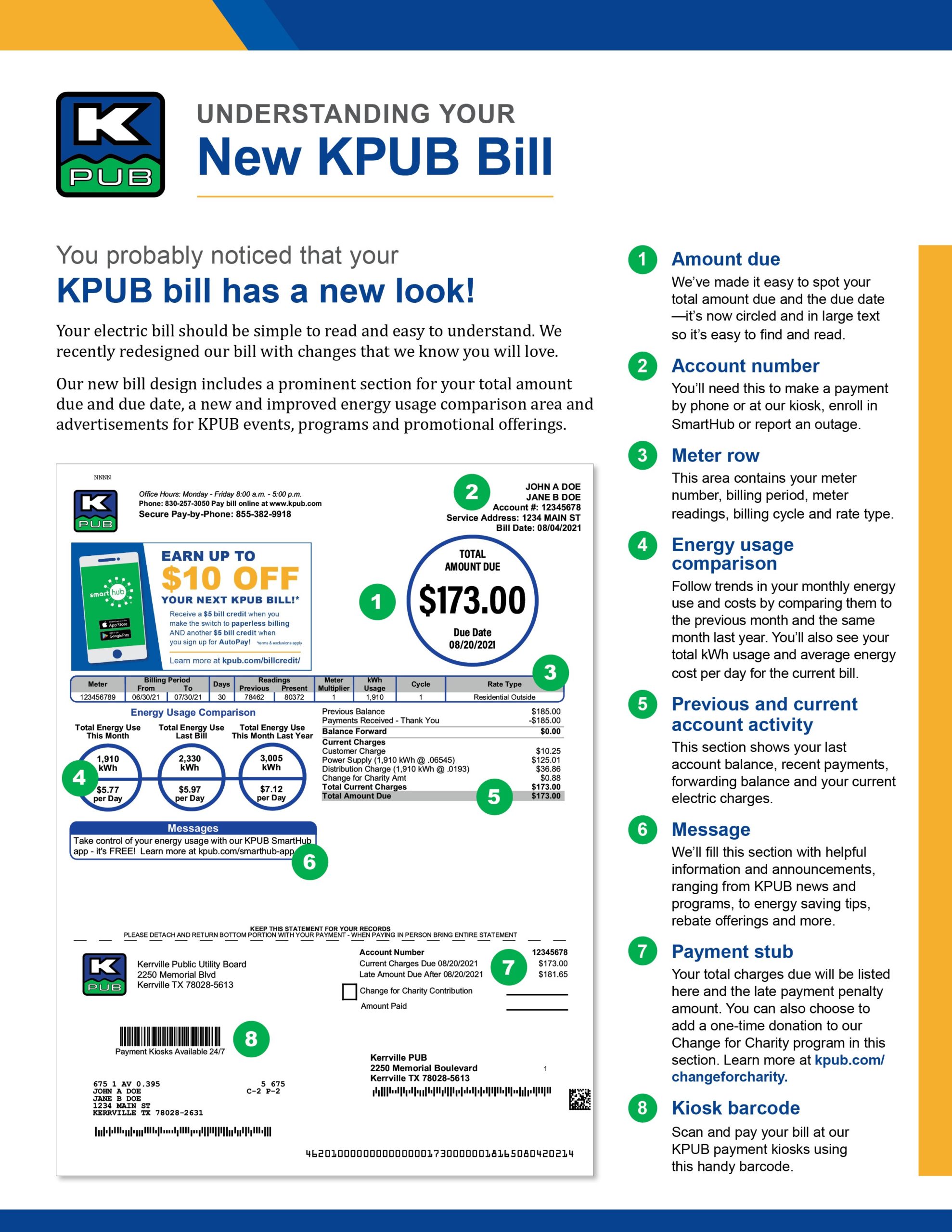Understanding your KPUB bill
Residential Customers
Our residential rate structure is comprised of three components that will appear under the detail of electric charges on your monthly bill: power supply charge, distribution charge and customer charge.
Power supply charge
The first component is the power supply charge that’s also based on energy consumption or kWh usage. This charge covers the cost to purchase energy on the wholesale ERCOT market and deliver that energy across the statewide transmission grid to our local substations.
Distribution charge
The second component is the distribution charge that varies based on how much energy (or kilowatt-hours (kWh)) a customer uses. This charge covers the cost to distribute power from one of our nine local substations to the customer’s home.
This includes the costs of:
- Maintenance to equipment like poles, wires and transformers,
- Operational activities to keep the system running and restore outages, and
- Construction activities to replace aging equipment, increase system capacity and/or improve reliability.
Customer charge
The third component is the customer charge. It is a fixed monthly charge that covers our costs for metering and billing an account. Billing includes data processing, calculating and printing bills, postage, and other administrative costs.
Commercial Customers
Our commercial rate structure is comprised of four components that will appear under the detail of electric charges on your monthly bill: power supply charge, distribution energy charge, distribution demand charge and customer charge.
Power supply charge
The first component is the power supply charge that’s also based on energy consumption or kWh usage. This charge covers the cost to purchase energy on the wholesale ERCOT market and deliver that energy across the statewide transmission grid to our local substations.
Distribution energy charge
The second component is the distribution energy charge that varies based on how much energy (or kilowatt-hours (kWh)) a customer uses. This charge covers part of the cost to distribute power from one of our nine local substations to the customer’s home.
This includes the costs of:
- Maintenance to equipment like poles, wires and transformers,
- Operational activities to keep the system running and restore outages, and
- Construction activities to replace aging equipment, increase system capacity and/or improve reliability.
The distribution energy charge is billed at two different kWh rates for usage:
- less than 2500 kWh
- greater than 2500 kWh
Distribution demand charge
The third component is the distribution demand charge. This charge is based upon the highest amount of power drawn during any 30-minute interval during the billing period.
This charge helps to ensure that low energy usage customers pay their fair share of the costs to serve them because the lines and equipment used to serve customers are sized based on the highest amount of power drawn by the customer.
Customer charge
The fourth component is the customer charge. It is a fixed monthly charge that covers our costs for metering and billing an account. Billing includes data processing, calculating and printing bills, postage, and other administrative costs.
Multiplier
You may notice a multiplier charge on your bill as a commercial customer. Standard meters available in the United States can normally handle currents up to 320 amps and voltages up to 480 volts. When a customer’s load will result in larger currents and/or voltages, specialized metering transformers are used so that the customer’s meter is only shown a portion of the energy and demand used by the customer, and a multiplier is used to accurately calculate the actual usage.
Billing
Bills are due when rendered and become past due if not paid within sixteen (16) days thereafter. Past due bills shall be assessed a one time penalty charge of 5% of the unpaid amount. Upon proof of age of over 60 years, the penalty for past due bills shall be waived.
Our standard bill cycles are cycle 01, 02, 03 & 04. Your KPUB bill is due on a Friday each month, and the dates will vary depending upon what cycle you fall under. Click the button below to view our bill cycle calendar for a listing of all your cycle’s due dates for the year.
If you’d like to select a billing cycle that works better for your pay schedule or budget, we are happy to change your cycle! Contact our customer service department at 830.257.3050 or email [email protected].
*please note, you can only change your billing cycle once a year.

